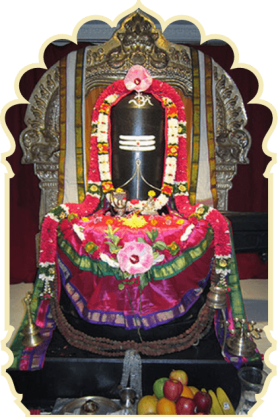
Shiva is one of the principal deities of Hinduism. He is the Supreme Being within Shaivism, one of the major traditions within contemporary Hinduism. Shiva is known as the “destroyer and the transformer” within the Trimurti, the Hindu trinity that includes Brahma and Vishnu. In Shaivism tradition, Shiva is the Supreme being who creates, protects and transforms the universe.
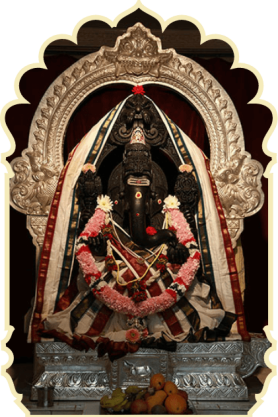
Ganesha also known as Ganapati, Vinayaka, Pillaiyar and Binayak, is one of the best-known and most worshipped deities in the Hindu pantheon. His image is found throughout India, Sri Lanka, Thailand, Bali (Indonesia), Bangladesh and Nepal. Hindu denominations worship him regardless of affiliations. Devotion to Ganesha is widely diffused and extends to Jains and Buddhists.
Although he is known by many attributes, Ganesha’s elephant head makes him easy to identify. Ganesha is widely revered as the remover of obstacles, the patron of arts and sciences and the deva of intellect and wisdom. As the god of beginnings, he is honored at the start of rites and ceremonies. Ganesha is also invoked as patron of letters and learning during writing sessions. Several texts relate mythological anecdotes associated with his birth and exploits and explain his distinct iconography.
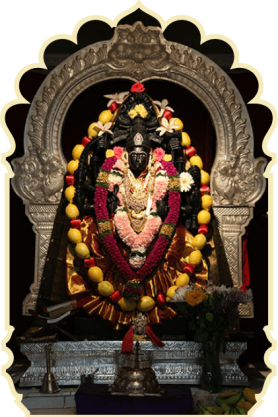
In the tradition of Hinduism called Shaktism, the Goddess, or Devi, is described as supreme, A goddess is stated to be the energy and creative power (Shakti) of each, with Parvati (Sati) the equal complementary partner of Shiva. She is also one of the chief Yoginis, a group of sixty-four or eighty-one Tantric goddesses, who are attendants of the warrior goddess Durga. The name is a combination of Chanda and Munda, two monsters whom Chamunda killed. She is closely associated with Kali, another fierce aspect of Devi. She is sometimes identified with goddesses Parvati, Chandi or Durga as well.
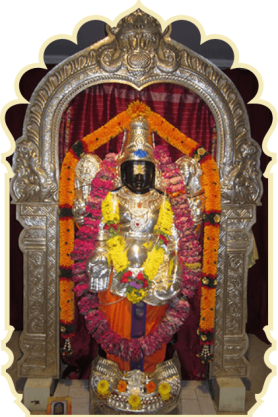
Another name for Balaji is Venkateshwara. Venkateswara literally means “Lord of Venkata”. The word is a combination of the words Venkata (the name of a hill in Andhra Pradesh) and isvara (“Lord”). According to the Brahmanda and Bhavishyottara Puranas, the word “Venkata” means “destroyer of sins”, deriving from the Sanskrit words vem (sins) and kata (power of immunity).
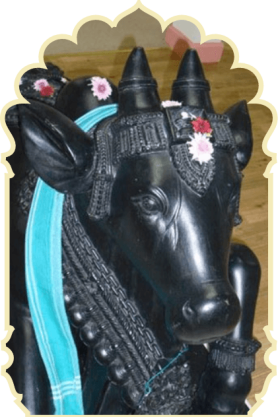
Nandi is the name of the gate- guardian deity of Kailasa, the abode of Lord Shiva. He is usually depicted as a bull which also serves as the mount to the god Shiva. According to Saivite siddhantictradition, he is considered as the chief guru of eight disciples of Nandinatha Sampradaya – Sanaka, Sanatana, Sanandana, Sanatkumara, Tirumular, Vyagrapada, Patanjali and Sivayoga Muni whowere send to eight directions to spread the wisdom of Shaivism.
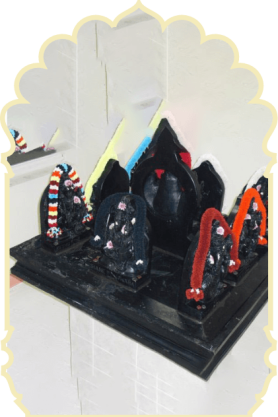
Navagraha means “nine planets” in Sanskrit and are nine astronomical bodies as well as mythical deities in Hinduism and Hindu astrology. These are the Sun, the Moon, Mars, Mercury, Jupiter, Venus, and Saturn, and the ascending and descending lunar nodes.The term is derived from nava (nine) and graha (Sanskrit: graha “planet, seizing, laying hold of, holding”).
The Navagraha are:

Shiva is one of the principal deities of Hinduism. He is the Supreme Being within Shaivism, one of the major traditions within contemporary Hinduism. Shiva is known as the “destroyer and the transformer” within the Trimurti, the Hindu trinity that includes Brahma and Vishnu. In Shaivism tradition, Shiva is the Supreme being who creates, protects and transforms the universe.

Ganesha also known as Ganapati, Vinayaka, Pillaiyar and Binayak, is one of the best-known and most worshipped deities in the Hindu pantheon. His image is found throughout India, Sri Lanka, Thailand, Bali (Indonesia), Bangladesh and Nepal. Hindu denominations worship him regardless of affiliations. Devotion to Ganesha is widely diffused and extends to Jains and Buddhists.
Although he is known by many attributes, Ganesha’s elephant head makes him easy to identify. Ganesha is widely revered as the remover of obstacles, the patron of arts and sciences and the deva of intellect and wisdom. As the god of beginnings, he is honored at the start of rites and ceremonies. Ganesha is also invoked as patron of letters and learning during writing sessions. Several texts relate mythological anecdotes associated with his birth and exploits and explain his distinct iconography.

In the tradition of Hinduism called Shaktism, the Goddess, or Devi, is described as supreme, A goddess is stated to be the energy and creative power (Shakti) of each, with Parvati (Sati) the equal complementary partner of Shiva. She is also one of the chief Yoginis, a group of sixty-four or eighty-one Tantric goddesses, who are attendants of the warrior goddess Durga. The name is a combination of Chanda and Munda, two monsters whom Chamunda killed. She is closely associated with Kali, another fierce aspect of Devi. She is sometimes identified with goddesses Parvati, Chandi or Durga as well.

Another name for Balaji is Venkateshwara. Venkateswara literally means “Lord of Venkata”. The word is a combination of the words Venkata (the name of a hill in Andhra Pradesh) and isvara (“Lord”). According to the Brahmanda and Bhavishyottara Puranas, the word “Venkata” means “destroyer of sins”, deriving from the Sanskrit words vem (sins) and kata (power of immunity).

Nandi is the name of the gate- guardian deity of Kailasa, the abode of Lord Shiva. He is usually depicted as a bull which also serves as the mount to the god Shiva. According to Saivite siddhantictradition, he is considered as the chief guru of eight disciples of Nandinatha Sampradaya – Sanaka, Sanatana, Sanandana, Sanatkumara, Tirumular, Vyagrapada, Patanjali and Sivayoga Muni whowere send to eight directions to spread the wisdom of Shaivism.

Navagraha means “nine planets” in Sanskrit and are nine astronomical bodies as well as mythical deities in Hinduism and Hindu astrology. These are the Sun, the Moon, Mars, Mercury, Jupiter, Venus, and Saturn, and the ascending and descending lunar nodes.The term is derived from nava (nine) and graha (Sanskrit: graha “planet, seizing, laying hold of, holding”).
The Navagraha are:
© 2024, JSS Spiritual Mission. All Rights Reserved
Report
Privacy Policy
Privacy Policy
Report